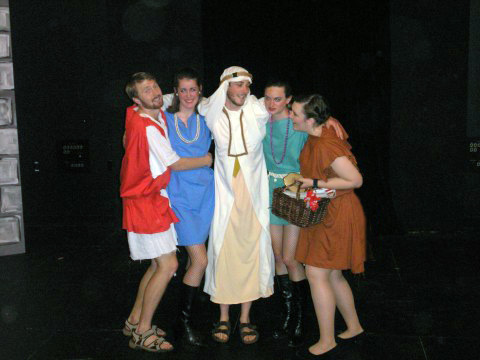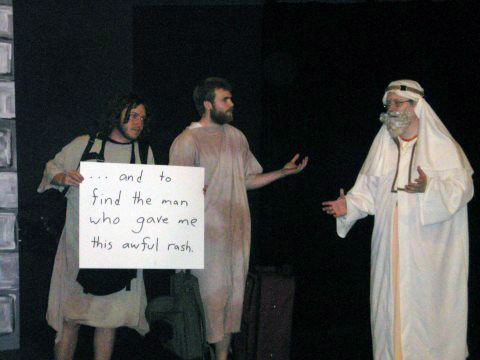Home
Actor/Spectator Home
Aristophanes' The Birds
Charlie Chaplin in The Immigrant
Menander's Perikeiromene
Frank Capra's It Happened One Night
Plautus'
Poenulus (Towelheads)
Bob Hope & Bing Crosby in
Road to Morocco
Conclusion
Photo Credits
|
Plautus'
Poenulus
|
 |
| The first interaction with the audience in Poenulus occurs in the prologue. Obviously, this interaction comes in the form of a direct address to the audience, as if the speaker and the audience are having a conversation. However, a unique quality of the prologue in Poenulus is the option of having an "Announcer" planted within the audience. In line 11, the speaker of the prologue says, "Psst! Announcer!" cueing him (a member of the audience) to speak. Because the Announcer is a member of the audience, it helps the spectators feel that someone is trying to speak on their behalf, and they have an even greater part in the so-called conversation. |
|
Another method of interaction in the prologue takes the form of a character giving the audience extra information about some part of the play. This helps the audience not only feel a part of a conversation with the cast, but also provides them with background information which only the characters of the play would normally know. This helps the audience feel more like active participants included in the production. This is the main purpose of the prologue, but one specific example starts at line 64. This section tells the story of how the protagonist, Boris, was "snatched away from his stately home, from his dad, and from Baghdad as a boy of seven" (Line 65-67). |
The technique of addressing the audience directly continues throughout the play in the form of asides. Asides let the audience know what a character is thinking or planning. They are spoken directly to the audience, as if the audience is the character's confidant. This gains the audience's sympathy for the speaking character.
|
|
Asides are used frequently in Poenulus. One example is when Igor says to the audience, "That's how rotten a guy this pimp the Wolf is; I got my grenade-launcher cocked and aimed right at the fool" (Line 200-1). By telling the audience this, Igor builds audience sympathy against the "rotten" Wolf, and he also lets them know his plans, involving them in the action through anticipation. |
Another tool used to interact with the audience is the soliloquy. With this technique, a character is left alone on stage and thinks aloud to himself. While this is not directed specifically toward the audience, it has the effect of the audience increasing their level of intimacy with a character through knowledge of his thoughts, thus increasing the audience's concern for that character, thereby involving them emotionally in the play. |
Examples of soliloquies in Poenulus include Boris' short exit soliloquy at the end of Act One, the Wolf's long monologue introducing his character at the beginning of Act Two, and Igor's monologue at the end of Act Four. Igor's monologue is particularly interesting because, although he talks to himself throughout it, he unexpectedly acknowledges the audience in the last line when he says, "all of you out here" (Line 929). This not only has comedic effect, it emphasizes the inclusion of the audience in the soliloquies.
|
|

One unique feature of Poenulus designed to include the audience is a sing-along song. In this translation, the cast sings the familiar song, "When The Saints Go Marchin' In," exchanging the word "saints" for "sluts." The audience is invited to sing along at the chorus. This lets the audience actively participate, not simply by drawing them into the storyline, but by letting them actually do something to contribute to the show. |
*Images from LAT-205 production of Plautus' Poenulus. Hope you enjoy.
|

